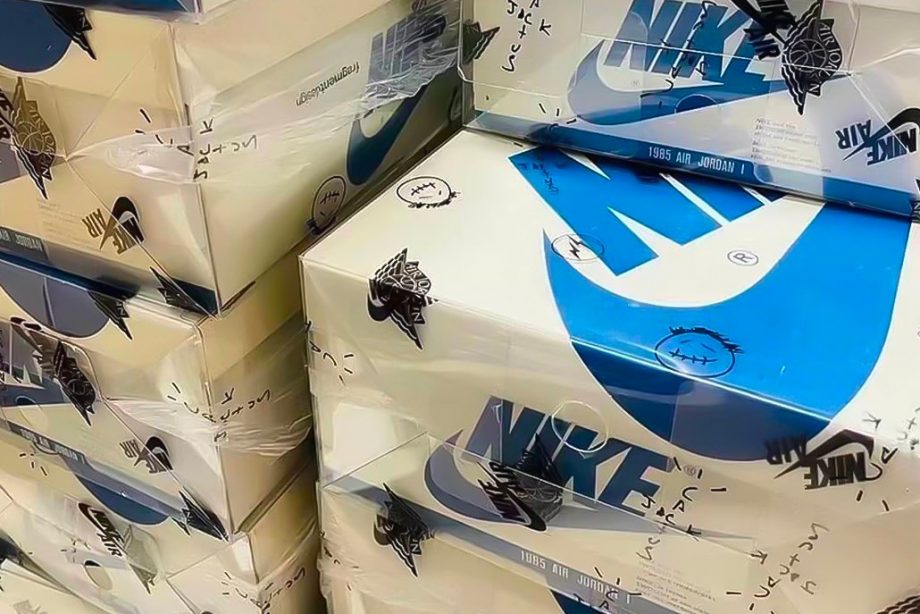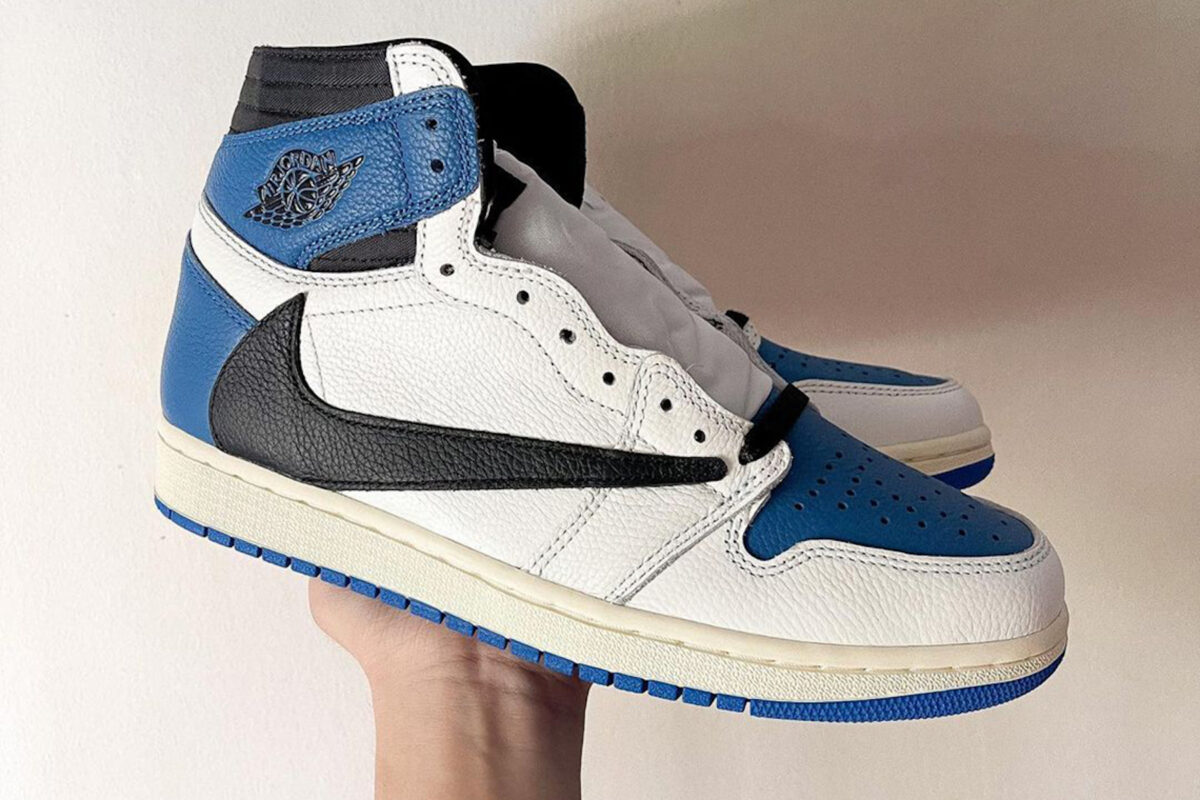Sneaker collaborations are big business.
It’s become an essential part of the modern sportswear brand business model: make a limited edition model in collaboration with a hot brand or celebrity, create artificial scarcity by deliberately keeping production numbers low, make them deliberately hard to purchase and bam! Watch them all sell out, at full price, in mere minutes – on top of the brand equity and free press you generate.
Some collaborations are hotter than others, however. A Kanye West, Virgil Abloh or Travis Scott co-sign is like a license to print money. Then, if you want to go really next-level, make it a three-way collaboration with a cult fashion brand.
That’s exactly what Nike’s done with the Travis Scott x Fragment x Nike Air Jordan 1 Highs. Both Scott and Fragment – the imprint of famed Japanese multidisciplinary artist and designer Hiroshi Fujiwara, who’s collaborated with everyone from Maserati to Moncler – have already released collaborative AJ1s individually with Nike, which rank as some of the most hyped, popular models of all time. Bringing the two together on a single pair makes financial sense.
Naturally, sneaker fans were keenly awaiting ‘drop day’ – which was spoiled by a rather brazen pair of profiteers in a move that’s emblematic of a growing problem not only within sneaker culture but in modern fashion more broadly.

Apparently, two individuals used raffle ‘bots’ to generate around 55,000 successful raffle entries, which netted them over 100 pairs each. They even headed to Twitter to brag about it, sharing screenshots of the bot’s interface and one even claiming they don’t even listen to Scott’s music.
If they truly did manage to secure 100 pairs each, they could be in for a serious payday. The sneakers retail for US$200 but are currently selling for at least US$2,800 on StockX. Even assuming a 12.5% StockX processing fee on each pair, they’d still be looking at a US$225,000 profit each. That’s huge.
RELATED: Expert Reveals Which Sneaker Investments Are Outperforming Blue Chip Stocks In 2021
Now there’s a good chance that they’re trolling, just to mess with sneakerheads. Of course, even if they weren’t, Travis Scott’s e-commerce team knows all about it now, and could easily just cancel all the botted transactions – they’ve shot themselves in the feet here.
But the fact this is even a thing shows how anti-consumer sneaker drops are becoming. Or, at least, even more anti-consumer…

“This event once again highlights a giant problem within the community, where sneakers have become so unattainable from both limited supply from the brands, and extremely unrealistic chances of winning raffles due to automated activity,” House of Heat relates.
“Should obtaining sneakers really require an exceptional knowledge of technology? Should brands and retailers do more to combat botting? Do they even care, considering that exclusivity and aftermarket demand continues to fuel the industry? The pressure is surely mounting – but when exactly that bubble will fully bust remains unseen.”
The problem with botting is that it’s not actually illegal – at least in the US, UK or Australia. While brands do try and combat the practice – Nike’s SNKRS app and Supreme’s habit of wildly changing their shopfront’s URL structures ahead of release stand out as notable examples – there’s an argument to be made that they don’t really care who they’re selling to, as long as they’re selling out.
RELATED: Unfortunate Reason The ‘Ugliest Watch Ever Made’ Will Sell Like Hotcakes
Sure, they might dilute some brand equity by frustrating consumers – but in many ways, the insane speculation on the grey or aftermarket actually benefits them as much as it benefits the profiteering botters.
The loser, of course, is the average consumer. The one who thinks they have a chance of winning a raffle or getting a pair. The one who can’t afford or justify spending thousands of dollars on a pair of basketball shoes.
Watch the teaser video for Travis Scott & Hiroshi Fujiwara’s sneaker collaboration
This sneaker fiasco speaks to a growing trend within fashion where exclusivity – more than authenticity, design or quality – is the driving force behind what’s popular. Being fashionable is all about your ability to access (or afford) what’s hyped, rather than being about one’s ability to actually style ones’ self.
It’s not just sneakers. You can’t just walk into a Rolex or Hermès boutique and walk out with a Submariner or a Birkin bag. Exclusivity is synonymous with luxury. Perhaps it just stings a little more with sneakers as sneakers are supposed to be an affordable, accessible good. Jordans aren’t luxury sneakers; they’re just increasingly priced like they are.
RELATED: Canada, China or Colombia? Where To Score Rolex’s Hard To Find Models
The profiteering that’s associated with all of this further cheapens modern fashion as a whole, turning shoes and shirts into business opportunities rather than clothing.
Thankfully, there will always be a market and respect for a man in a simple, well-tailored suit. Some things withstand trends. But it’s frustrating to see how the definition of fashion and luxury is being artificially manipulated by both bad actors – as well as the brands who often turn a blind eye to their antics.
